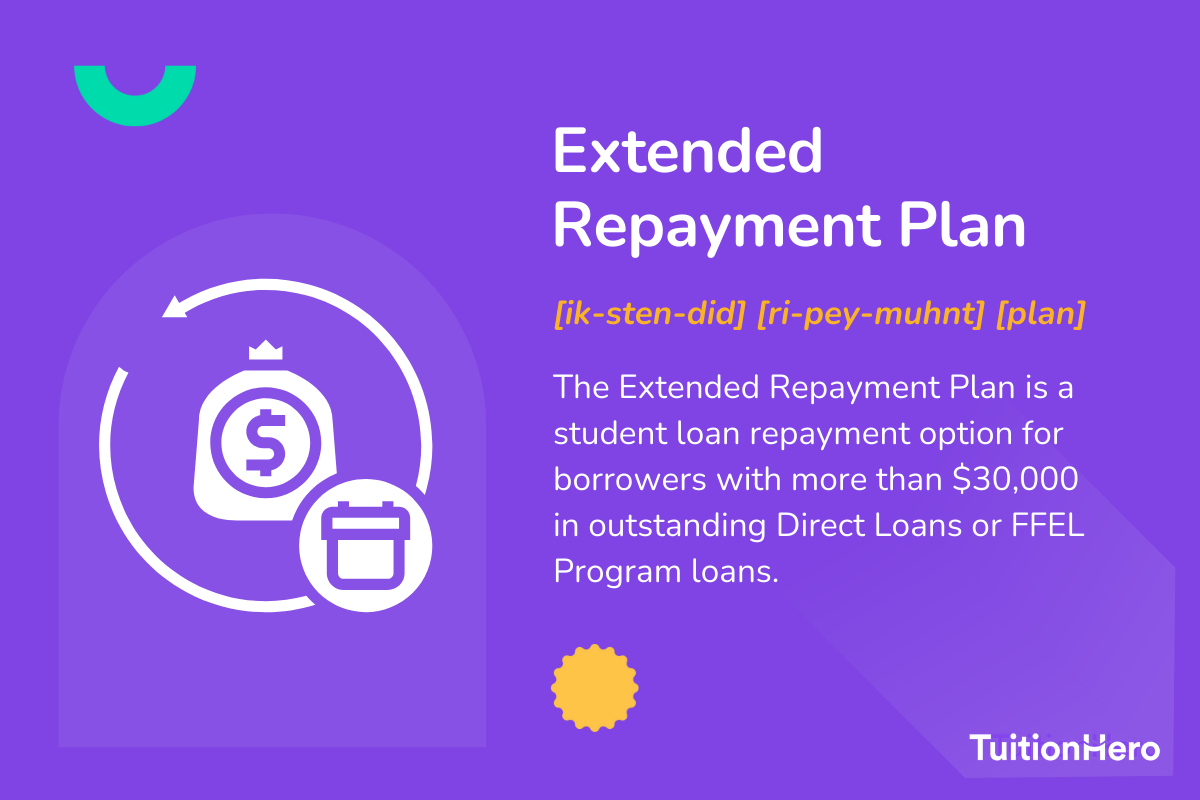Advertiser Disclosure
Last update: November 16, 2024
4 minutes read
Student Loan Extended Repayment Plan Explained
Wondering how the student loan extended repayment plan affects you? Learn the ins, outs, and financial impacts in this guide.

By Brian Flaherty, B.A. Economics
Edited by Rachel Lauren, B.A. in Business and Political Economy
Learn more about our editorial standards



By Brian Flaherty, B.A. Economics
Edited by Rachel Lauren, B.A. in Business and Political Economy
Learn more about our editorial standards
In a world where people talk a lot about how to pay back student loans, it's important to understand your choices. This article explains how the extended repayment plan works so you can choose wisely. Your decision can impact your financial situation for a long time. For more details, read our tips on managing student loans.

Key takeaways
- Extended repayment plans lower monthly payments, but increase total interest paid
- Eligibility requires more than $30,000 in loans
- Switching plans can reset your repayment schedule
What is the student loan extended repayment plan?
When you're faced with student loan debt, understanding your repayment options is important. The extended repayment plan offers a longer timeline to repay your loans, increasing the standard 10-year timeline to 25 years. This will reduce your monthly payments but increase the total interest paid over the life of the loan.

Eligibility criteria
To qualify for this repayment plan, you need to have more than $30,000 in outstanding Direct Loans or FFEL Program loans. This plan is accessible for most borrowers, but it's important to know if it aligns with your financial goals.
How does it work?
The extended repayment plan stretches your loan payments over a longer period, which can greatly lower your monthly obligation compared to the standard 10-year repayment term. This plan can be structured with fixed or graduated payments, adjusting to suit your evolving financial situation. However, along with the lower monthly payments comes higher total interest, meaning your overall bill over the life of the loan will be larger.
Comparing costs over time
It's important to look beyond the immediate relief of reduced monthly payments. Over the length of the repayment term, you might end up paying significantly more in interest. This long-term financial impact is a vital consideration for anyone weighing their options.
Alternative repayment options
While the extended repayment plan might seem appealing for its lower monthly payments, other options could serve you better. Income-driven repayment plans adjust your payments based on your income and family size, potentially offering more relief and eligibility for loan forgiveness after a certain period. Income-driven repayment offers forgiveness after 20 or 25 years of payments.
Compare private student loans now
TuitionHero simplifies your student loan decision, with multiple top loans side-by-side.
Compare Rates
Effect on credit score
How does it affect your credit?
Deciding to use a longer repayment plan can affect your credit score. When you choose this plan, your monthly payments go down, making it easier to pay on time.
This can help improve your credit score over time and improve your monthly debt-to-income obligations, making it easier to borrow money in the future (especially for a mortgage). However, carrying debt for a longer period might reduce these benefits, especially if you're planning large financial commitments like a mortgage.
Long-term considerations
Taking care of your monthly payments is important, but you should also think about how it affects your credit in the long run. If you take more time to pay back, your credit history gets longer, but it also means you're exposed to debt for a longer time.

TuitionHero Tip
Finding the right balance is important to keep your credit in good shape.
Life changes and flexibility
Adjusting your plan
Life is unpredictable. Changes in income, job status, or family size can greatly affect your ability to meet your monthly loan payments. The extended repayment plan gives you some breathing room, but it's important to remember that flexibility has its limits.
Considerations for changing plans
If you find yourself in a very different financial situation, exploring other repayment options or even loan refinancing could be worth a try. Remember, changing plans can reset the clock on your repayment term, so think about it carefully.
Loan forgiveness opportunities
Does the extended repayment plan qualify for loan forgiveness?
One essential aspect to consider is the eligibility for loan forgiveness programs. While the extended repayment plan reduces your monthly burden, it might not qualify you for certain forgiveness programs that are tied to income-driven repayment plans.


Why trust TuitionHero
At TuitionHero, we simplify student loan management. Our platform offers tools to handle loans and connects you with lenders for private loans and refinancing. Whether you're exploring extended repayment plans or scholarships, we're here to assist. Make informed financial decisions with TuitionHero.
Frequently asked questions (FAQ)
Yes, you can change your repayment plan if your financial situation changes or if you find a better plan for you. But, before you decide, think about what might happen, like how much interest you'll have to pay or if your payment schedule will reset.
Remember that the extended repayment plan lowers the minimum you have to pay each month, but you can always pay more if you can afford to. This can potentially save you money over the course of the loan. For managing these changes, TuitionHero's resources on refinancing student loans can give you valuable insights.
Making extra payments on your extended repayment plan can help you pay less interest overall. Even if you add a little extra each time, it can make your repayment time shorter and save you money in the end. This approach requires you to manage your money well, but it's a straightforward way to cut down your costs.
Consolidating your federal student loans can affect your eligibility for the extended repayment plan. Consolidation can sum up your existing loans into one with a new interest rate and possibly extend your repayment term.
Consolidation can also help qualify you for income-driven repayment plans, which might be an even better fit than the extended plan. It's essential to consider how consolidation will affect your total loan balance and repayment period, potentially qualifying you for the extended repayment plan. Our guide on navigating student loans can help you understand these details.
Choosing the extended repayment plan for your student loans can affect your taxes. You can deduct some student loan interest from your taxable income each year.
However, with the extended plan, you might pay more interest over time. It's smart to talk to a tax advisor to know how your choice of repayment plan could impact your taxes.
Joining the extended repayment plan can affect how much you owe, compared to how much you earn. Lenders look at this when you want to borrow more money, whether that’s for going back to school or buying a home.
It's important to balance your monthly debt payments so they're affordable. To do this, you need to plan your finances carefully and understand how your current debt might affect your ability to borrow in the future.
Final thoughts
Understanding student loan repayment might seem complicated. The extended repayment plan is one way to make your monthly payments smaller. But, be aware that it comes with more interest over time.
Like any financial decision, it's important to think about what works best for you. Consider your own situation and think about the pros and cons of the plan. If you take the time to figure out what's best for you, it can save you time, money, and stress.
Source
Author

Brian Flaherty
Brian is a graduate of the University of Virginia where he earned a B.A. in Economics. After graduation, Brian spent four years working at a wealth management firm advising high-net-worth investors and institutions. During his time there, he passed the rigorous Series 65 exam and rose to a high-level strategy position.
Editor

Rachel Lauren
Rachel Lauren is the co-founder and COO of Debbie, a tech startup that offers an app to help people pay off their credit card debt for good through rewards and behavioral psychology. She was previously a venture capital investor at BDMI, as well as an equity research analyst at Credit Suisse.
At TuitionHero, we're not just passionate about our work - we take immense pride in it. Our dedicated team of writers diligently follows strict editorial standards, ensuring that every piece of content we publish is accurate, current, and highly valuable. We don't just strive for quality; we aim for excellence.
Related posts
While you're at it, here are some other college finance-related blog posts you might be interested in.
Shop and compare student financing options - 100% free!

Always free, always fast
TuitionHero is 100% free to use. Here, you can instantly view and compare multiple top lenders side-by-side.

Won’t affect credit score
Don’t worry – checking your rates with TuitionHero never impacts your credit score!

Safe and secure
We take your information's security seriously. We apply industry best practices to ensure your data is safe.
Finished scrolling? Start saving & find your private student loan rate today



